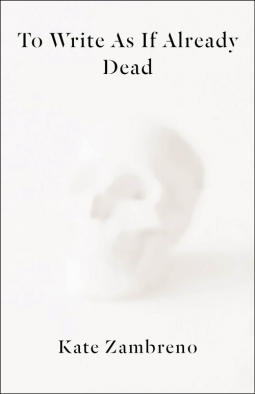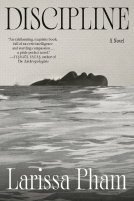
To Write as if Already Dead
by Kate Zambreno
This title was previously available on NetGalley and is now archived.
Send NetGalley books directly to your Kindle or Kindle app
1
To read on a Kindle or Kindle app, please add kindle@netgalley.com as an approved email address to receive files in your Amazon account. Click here for step-by-step instructions.
2
Also find your Kindle email address within your Amazon account, and enter it here.
Pub Date Jun 08 2021 | Archive Date Sep 15 2021
Talking about this book? Use #ToWriteAsIfAlreadyDead #NetGalley. More hashtag tips!
Description
The first half of To Write As If Already Dead is a novella in the mode of a detective story, searching after the mysterious disappearance of an online friendship after an intense dialogue on anonymity, names, language, and connection. The second half, a notebook documenting the doubled history of two bodies amid another historical plague, continues the meditation on friendship, solitude, time, mortality, precarity, art, and literature.
Throughout this rigorous, mischievous, thrilling not-quite study, Guibert lingers as a ghost companion. Zambreno, who has been pushing the boundaries of literary form for a decade, investigates his methods by adopting them, offering a keen sense of the energy and confessional force of Guibert’s work, an ode to his slippery, scarcely classifiable genre. The book asks, as Foucault once did, “What is an author?” Zambreno infuses this question with new urgency, exploring it through the anxieties of the internet age, the ethics of friendship, and “the facts of the body”: illness, pregnancy, and death.
Advance Praise
"This book is a tour de force. I was completely awestruck by the way Zambreno enacts the concept of the title, and by the way she writes the body, hers and Guibert’s."
—Moyra Davey, author of Index Cards: Selected Essays
"Zambreno’s most urgent and charged work since Heroines."
—Brian Blanchfield, author of Proxies: Essays Near Knowing
"Here, as ever, Zambreno proves herself a brilliantly generous and ambitious reader, one capable of engaging a text so acutely that the line between self and art blurs. To Write As If Already Dead is gossipy and smart, angry and agile, doubling and doubled—and a serious pleasure to read."
—Danielle Dutton, author of Margaret the First
"Kate Zambreno stylizes a thrilling form of reading as writing and writing as reading, one that speaks to the overlapping crises of our contemporary moment. No one thinks better and more carefully about the embodied practice of writing. She is the only person who could have written this book."
—Amy Hollywood, author of Acute Melancholia and Other Essays
"Guibert’s voice is restored to the present through an act of transportation that left me slightly afraid of Zambreno’s power. But then that’s why you read her, and him: for a new awe of life."
—Andrew Durbin, author of Skyland
Available Editions
| EDITION | Other Format |
| ISBN | 9780231188456 |
| PRICE | $20.00 (USD) |
Average rating from 7 members
Featured Reviews
 Michelle P, Reviewer
Michelle P, Reviewer
A beautiful, erudite exploration of writing and parenthood. With far-ranging references to the works and lives of the likes of Baudelaire and Foucault, Zambreno examines what it means to write and to attempt to live a life of the mind in the midst of life's complexities. Wonderful, thought-provoking, and unexpected, a must-read for anyone attempting art in the midst of intense familial obligations.
 Educator 505105
Educator 505105
This really defines categorisation; it's a mimetic piece of autofiction that thinks through Herve Guibert's own famous piece of autofiction, 'To The Friend Who Did Not Save My Life.' Theoretically grounded, it places with Barthes and Foucault, Kristeva and Mary Douglas; entirely personal, it dissects the writer's body and friendships, running analogously alongside (and against) its analysis of Guibert's own dissection of his body and friendships as he died of AIDs. It meditates on the death of the author, both figurative and literal; on how one writes when one is soon to be, or already, dead, on posthumous publication, on the problems of writing as a living writer about the living. I had difficulty putting a name to the genre Zambreno was using, but I was thoroughly delighted by the tangle of thought, theory, confession, literary criticism and memoir.
 Giancarlo L, Media/Journalist
Giancarlo L, Media/Journalist
Kate Zambreno's new book beautifully weaves together many interrelated threads into a prismatic and often poetically charged narrative that explores the body, womanhood/motherhood, illnesses both individual and societal, and what it means to "write" and/or "write through" the body.
She covers a lot of ground here, centrally focusing on Herve Guibert and his writing of the body, particularly his own body living with AIDS. She interleaves this with a diaristic chronicling of her difficult second pregnancy, which overlaps with the beginning of the Covid-19 pandemic and New York's lockdown in March/April 2020.
I found Zambreno's discussions of "autofiction" (both via Guibert and via her own work) particularly interesting - the ways our fictionalized selves can both resemble us and become our avatars, taking on characteristics beyond the scope of our off-the-page lives.
Thanks to Columbia University Press and NetGalley for the ARC!







